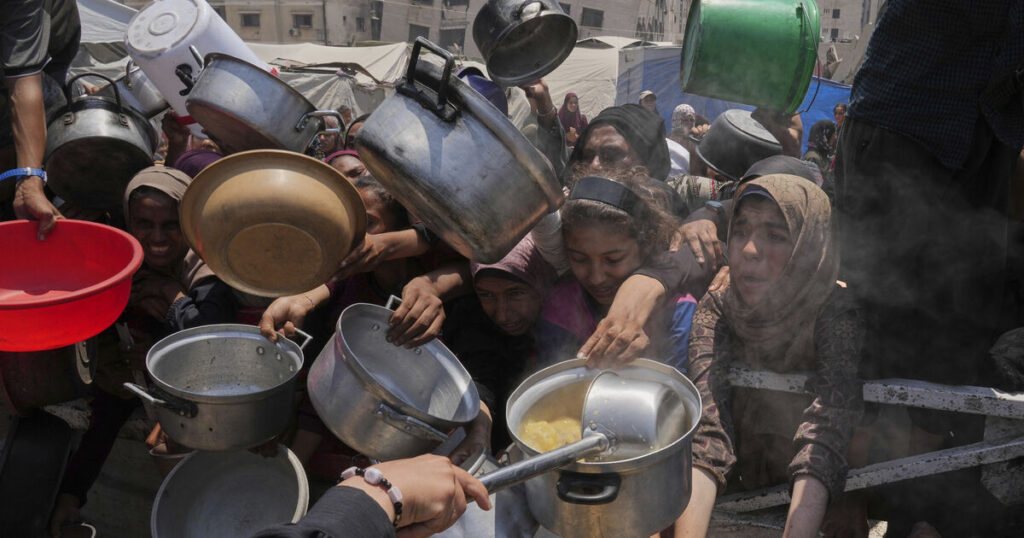The Israeli military announced a daily 10-hour pause in fighting in three populated areas of Gaza to facilitate aid delivery to Palestinians in dire need.
This move aims to alleviate the growing hunger crisis in Gaza, as Israel faces increased international scrutiny over its actions during the ongoing 21-month conflict.
The military stated that the “tactical pause” will occur in Gaza City, Deir al-Balah, and Muwasi, regions with significant population densities, to “increase the scale of humanitarian aid” entering the territory.
The pause will be implemented daily from 10 a.m. to 8 p.m. local time, commencing on Sunday and continuing until further notice.
The military also reported conducting aid airdrops into Gaza, delivering packages containing flour, sugar, and canned food.
For months, food experts have cautioned about the potential for famine in Gaza, where Israel has imposed restrictions on aid, claiming that Hamas diverts resources to strengthen its control.
Recent images depicting severely malnourished children in Gaza have intensified global criticism of Israel, including from its allies, who are demanding an end to the war and the resulting humanitarian crisis.
Israel emphasized that these new measures are being implemented while it continues its offensive against Hamas in other areas.
This localized pause in hostilities comes after ceasefire negotiations between Israel and Hamas appeared to stall.
On Friday, both Israel and the US withdrew their negotiating teams, accusing Hamas of obstructing progress. Israel indicated it was exploring “alternative options” to ceasefire talks with the militant group.
Following the breakdown of the previous ceasefire in March, Israel completely blocked the entry of food, medicine, fuel, and other essential supplies into Gaza for two and a half months, citing the need to pressure Hamas to release hostages.
Due to international pressure, Israel slightly eased the blockade in May.
Since then, approximately 4,500 trucks carrying aid from the UN and other organizations have been allowed to enter for distribution.
However, the average of 69 trucks per day falls significantly short of the 500 to 600 trucks the UN deems necessary to meet Gaza’s needs.
The UN reports difficulties in distributing much of the aid due to hungry crowds and organized groups seizing the supplies from arriving trucks.
To circumvent the UN’s distribution system, Israel has supported the US-registered Gaza Humanitarian Foundation, which opened four centers in May to distribute food packages.
According to the UN human rights office, over 1,000 Palestinians have been killed by Israeli forces since May while attempting to access food, primarily near these new aid distribution sites.
Throughout the war, Israel has consistently criticized the UN, alleging that its system allows Hamas to steal aid, a claim for which it has provided no evidence.
The UN denies these allegations, asserting that its delivery mechanism represents the most effective way to deliver aid to Palestinians.
The military stated that the new measures were implemented in coordination with the UN and other humanitarian organizations.
Much of Gaza’s population, squeezed by fighting into increasingly smaller areas, is now dependent on aid.
The war began with Hamas’s attack on southern Israel on October 7, 2023, resulting in the deaths of 1,200 people, predominantly civilians, and the abduction of 251 hostages.
Hamas continues to hold 50 hostages, with the majority believed to be deceased.
Israel’s retaliatory offensive has resulted in the deaths of over 59,700 Palestinians, according to Gaza’s Hamas-run health ministry.
While the ministry’s count does not differentiate between militants and civilians, it reports that more than half of the fatalities are women and children.
The ministry operates under the Hamas government and is considered by the UN and other international organizations to be the most reliable source of casualty data.


